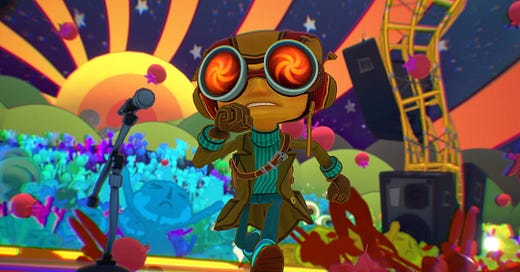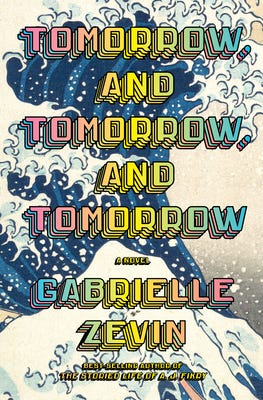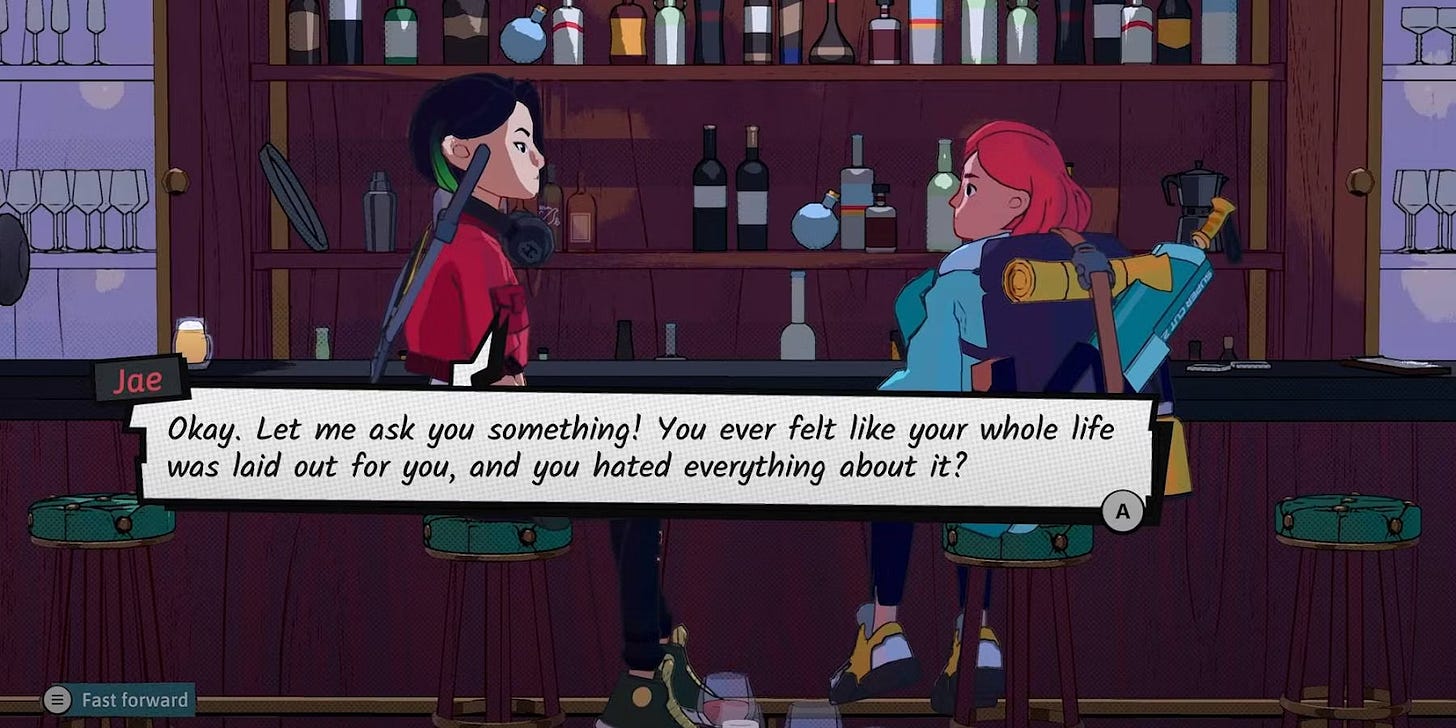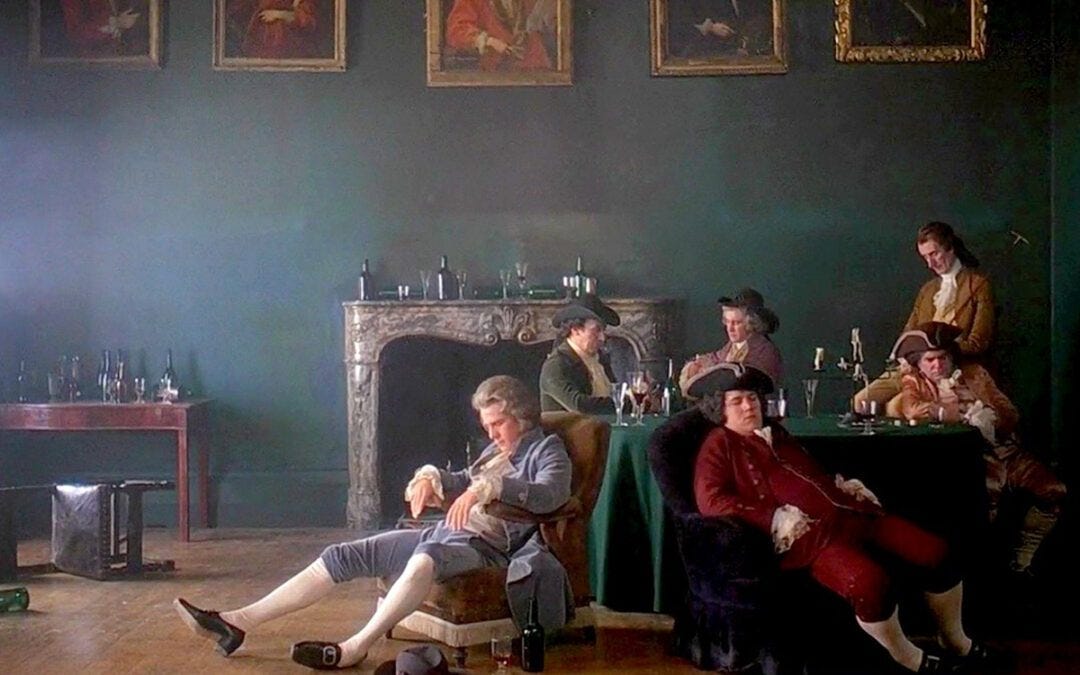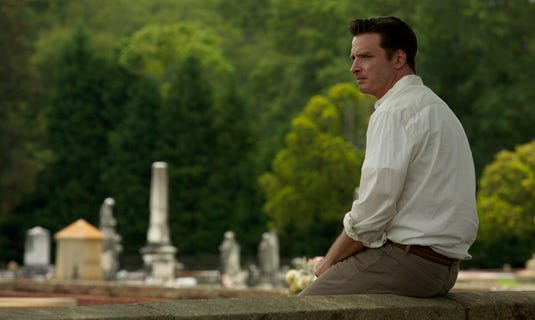
What I’ve been doing lately 2
A smorgasbord: Gabrielle Zevin's Tomorrow and Tomorrow and Tomorrow; looking back on Double Fine's Psychonauts; revisiting Kubrick; re-reading Marilynne Robinson; more film recommendations from 2024
A (fictional) book about video games, a video game, and documentaries about making video games
I’ve recently read Gabrielle Zevin’s Tomorrow, and Tomorrow, and Tomorrow. The book follows Sam and Sadie, two childhood best friends who go on to form a game company and make video games together. It spans decades as their relationship is tested.
As a life-long gamer, I found the references to real-life videogames and use of interviews in gaming publications to create an immersive reading experience, as if reading a very long and intimate New Yorker article profiling the lives of two game developers. I think the central relationship is well-realised, although I find the dialogue can be a little on the nose in some sections, and am personally not a fan of very long sections of exposition into the thoughts of characters. The friendship between Sadie and Sam is tenuous and abrasive, with streaks of professional and personal jealousy, but it is also loving and supportive. Friendships are messy organisms. I would love to see it adapted into a film or series.
Video games really got me into storytelling narratives and piped me into discovering cinema. I was always drawn to games with compelling narratives, and that told cinematic stories. The Mass Effect trilogy and Red Dead Redemption really made an impression on me when I was younger and they pushed me to find more stories with their moral complexity. While films now better fulfil my search for narrative, I still find myself seeking out novel concepts in video games, like the fictional ones outlined in Zevin’s novel, which are able to tell stories in a way a non-interactive medium cannot. And when I think of unique video games, my mind invariably wanders to Double Fine.
Double Fine is most known for being led by creative designer and writer Tim Schafer, who acts as a sort of frontman for the company and its ethos. The company is most known for Psychonauts, its sequel, and Brutal Legend (starring Jack Black). I have always loved their innovative approach to crafting games with a strong focus on unique stories, typically comedic, and mechanics that complement the story. Psychonauts will always be, one of my favourite games. In it, a young boy named Raz runs from the circus to join a summer camp for psychics. Each level has Raz transporting into the actual minds of characters replete with literal “emotional baggage”. Every level is unique in its expression of the characters' mental worlds. An old general imagines the world as a large war board game, a dentist’s mind filled with terrifying teeth, and my favourite: a milkman who is a conspiracy theory wonk that imagines a suburb where every person is a poorly disguised CIA agent trying to blend in.
While reading Zevin’s novel, which goes into particular detail about the game development process, it reminded me of Double Fine Adventure which is a long 20 episode documentary series chronicling the development of Double Fine’s Broken Age over a period of three years. I backed Broken Age more than a decade ago. While the game was kind of a dud for me, I followed the documentary throughout the development process and felt it was immensely rewarding. The series goes in depth into the emotional journey of the game’s creation: needing to keep people employed as an independent studio, finding the creative spark for the game, balancing personal lives, and not wanting to disappoint their backers (at the time one of the largest Kickstarter projects ever).
I think the fact that the game landed with a bit of a thud shows that sometimes you pour literal years into a creative pursuit with zero idea if it’s going to land for people. The series at least shows that, regardless of outcome, these games come from a special place of sincerity. A sincerity well-captured by Zevin’s novel as well. Video games are a form of art, although some have more artful direction than others. I’m less likely to argue on the artfulness of a blockbuster like Call of Duty or Candy Crush which are machined to generate income more than to express a unique vision. I am glad a studio like Double Fine exists, and still does. Independent video game development is at the forefront of innovation, and with the recent pressures on the video game industry, it has become much more difficult to stick around and make unique video games for niche audiences.
I highly recommend the documentary series if you have the time, and there’s a follow-up documentary: PsychOdyssey which follows the studio over 7 years as they develop their phenomenal sequel to Psychonauts. I haven’t seen it but I’m sure if you have an interest in the inner workings of a very creative game studio, it’s worth checking out.
I’ve also recently completed the game Dungeons of Hinterberg which reminded me of the charm and sincerity of Double Fine. It tells the story of Luisa, a burnt out junior lawyer, who goes to Hinterberg, a town in the alps in which magic has suddenly appeared, and joins tourists in slaying magical demons as a retreat from her career. In it, there’s commentary on the effects of tourism on the local environment and community, career burnout, finding a purpose, finding identity, and creating community. Now, where have you ever heard of a concept like that? While the combat and Persona-like social systems in the game are rudimentary at best, somewhat clunky and repetitive, the game wears its heart on its sleeve. It’s awfully twee with Luisa very successfully helping every single tourist or villager with sorting out their personal issues. Yet I find the game so sincere in a cosy way as I get to know its characters. These arcs are simplistic but satisfying, and incredibly moreish. The way it held my attention makes me think I might finally be ready to tackle one of these mammoth Persona games.
Revisiting
August has also been a month of reacquainting myself with old classics. (Click through the links for my sometimes long, sometimes short Letterboxd reviews)
With The Projector’s recent Kubrick retrospective, I was able to revisit both A Clockwork Orange (1971) and Barry Lyndon (1975) on the big screen. Kubrick is one of the first filmmakers one will discover on a journey towards cinephilia and I was interested to see how I would feel about him now. I’ve been a slight Kubrick detractor in recent years, and my vague memories of his films have not aged terribly well. I find him to be a cold and detached director, whereas I prefer films with a certain earnestness. It was surprising to find that A Clockwork Orange with its provocative subject matter feels more relevant than it did before in our modern age. I thought it would be the film I found more gratuitous and instead the opposite has happened. I find Barry Lyndon to be the more hollow film despite it being my previous favourite Kubrick. I rarely rewatch films but it is a treat to revisit films that have long faded in my memory because they teach you more about you than the film itself, which has, of course, remained unchanged. I was also able to rewatch Terry Gilliam’s Brazil (1985), and there are few movies with better production or costume design. A masterpiece of imagination.
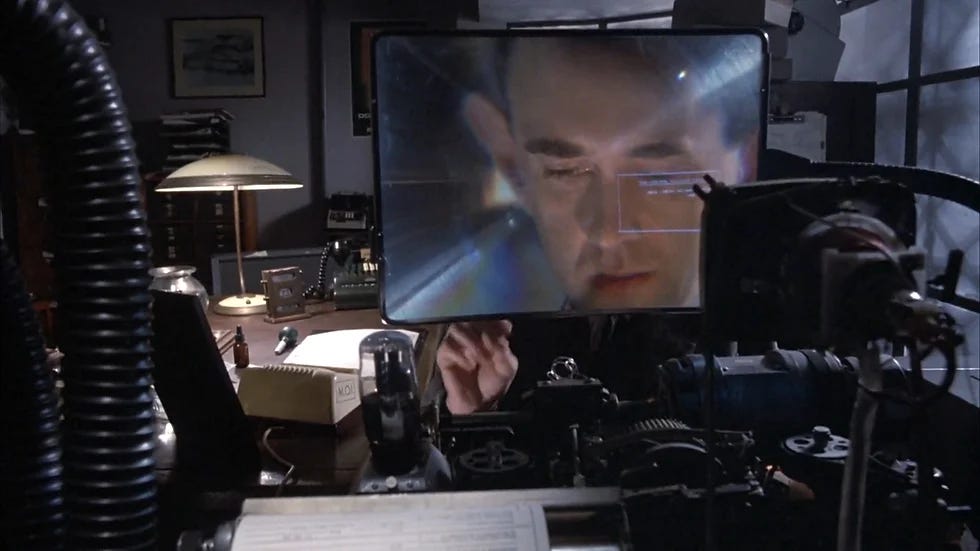
On the reading front, I have decided to return to the books of Marilynne Robinson after a jaunt through the library had me finding her most recent novel, Jack, part of her now four book series beginning with the Pulitzer Prize winning Gilead. I was lucky in that my literature cohort in junior college was made to read Robinson’s luminous debut novel Housekeeping which is one of my favourite books. Robinson’s prose is beautiful, elegiac, and probably the reason I am a sucker for writers with poetically inclined prose. I have finished re-reading Gilead, and its form, an epistolary reflection from an aged pastor to his son, is spellbinding and immersive. Robinson’s ability to first obfuscate and then elucidate the actual “story” behind the letters is effortlessly deft. The next novel, Home, shifts perspective to another character, switching from first-person to third, and casts new light on characters in Gilead to build further dimension to the community of the fictional town of Gilead. I’m currently re-reading the third novel, Lila, and cannot wait to sink into the most recent novel. And at the end of that, a little Housekeeping. I might go long on Robinson's work on a separate piece, because their tone and thematic concerns remind me a lot of a television show I watched and loved a long time ago: SundanceTV’s Rectify.
Other older films
I had a really good time watching Audrey Hepburn and Cary Grant doing their thing in the Stanley Donen classic Charade (1963). It’s fun, twisty and their old Hollywood charm is as vibrant as it always was.
For something way less palatable, I also saw David Cronenberg’s The Fly (1986) which is gross, strange, and fun. There’s a flatness to the proceedings which makes all the icky stuff much starker in juxtaposition. Jeff Goldblum is so odd in this, even before he starts turning into a fly.
I am also suited up and ready for Ridley Scott’s Gladiator II (2024) now that I have finally seen the original film. I have been thinking a lot about what happens after Scott and his peers stop making movies. Hollywood has already changed so much, and I’m worried it will not evolve for the better when the old guard stops making films.
New releases
Here are some newer releases I recommend from the year that I watched recently. I won’t write more on them but you can click through to read my brief Letterboxd reviews: Trap (2024), Alien: Romulus (2024), Ghostlight (2024).
Otherwise, if you’ve been reading, I hope you’ve been doing well lately!

